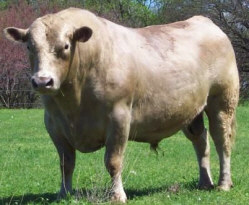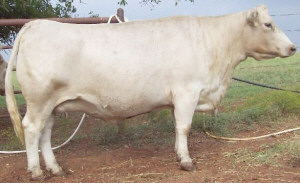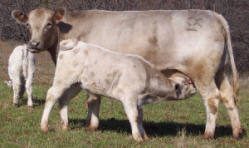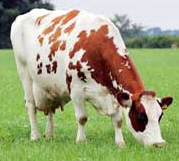



Murray Grey
History
According to the Australian legend, the first Murray Grey was born on the Thologolong property of Peter Sutherland in New South Wales in 1905, to a light roan Shorthorn cow and an Aberdeen Angus bull. The legend goes on to recount how this one cow gave birth to 12 off colour calves, from which Mrs. Helen Sutherland, cousin to Peter, developed the breed. Anecdotal evidence suggests that the breed actually originated throughout Australia as ranchers used “blue roan” bulls on their “blue roan” females. Photo courtesy of Beaver Creek Farm, www.murraygrey.net |
It became known, that these cattle grew quickly, were superior converters of feed and possessed carcase merit. Local cattlemen were attracted by the Grey's size and appearance and began developing the breed.
By the early 1960's several breeders were successfully breeding commercial Murray Greys and the Murray Grey Beef Cattle Society was formed to register the cattle and to administer the breed.
The breed was imported to the UK and the USA in the early 1970’s. In the UK they had to compete with continental cattle from Europe which were also arriving in the UK, They suffered from farmers trying to compare them with continental breeds, when they were bred to do a different job, namely a very good suckler cow. In the USA the industry was selecting for frame size and the breed were almost pushed to the sidelines were it not for a dedicated group of breeders.
During the 1990's, breeders began producing Murray Greys that were of sufficient frame size to be commercially acceptable and interest in the breed has flourished. In Australia Murray Greys attract overseas markets such as Japan and Korea for live and carcase imports because of the economical performance in feed lots and the quality of the meat. Now, the American Murray Grey breeders had begun to produce black cattle, opening that huge proportion of the commercial market long dominated by black haired breeds.
Characteristics
Murray Greys vary in colour from dark grey to light silver and can also come in dun and most recently black. From their Angus ancestors, they inherited dark skin pigmentation and are not susceptible to skin or eye problems in severe climates. Photo courtesy of Beaver Creek Farm, www.murraygrey.net |
The breed is naturally polled and are noted for their docile temperament. They have proved adaptable to most climatic conditions.
Murray Greys are easy care cattle. They calve easily, the females milk well, they grow quickly, they readily convert grass to beef, they fatten on grass, they finish economically in feed lots and they have high yields of saleable beef.
The breed are noted for the production of marbled beef without excess subcutaneous or inter-muscular seam fat. In Australia this is vital for export to Japan and other Asia markets.
Statistics
Comparative
Distribution
The breed has spread from Thologolong throughout Australia and to New Zealand, Asia, North America and the UK. Photo courtesy of Beaver Creek Farm, www.murraygrey.net |
References (the above information was cited from the following sites)
www.murraygreybeefcattle.com
www.murraygrey.com.au
www.murray-grey.co.uk
www.murraygrey.net


